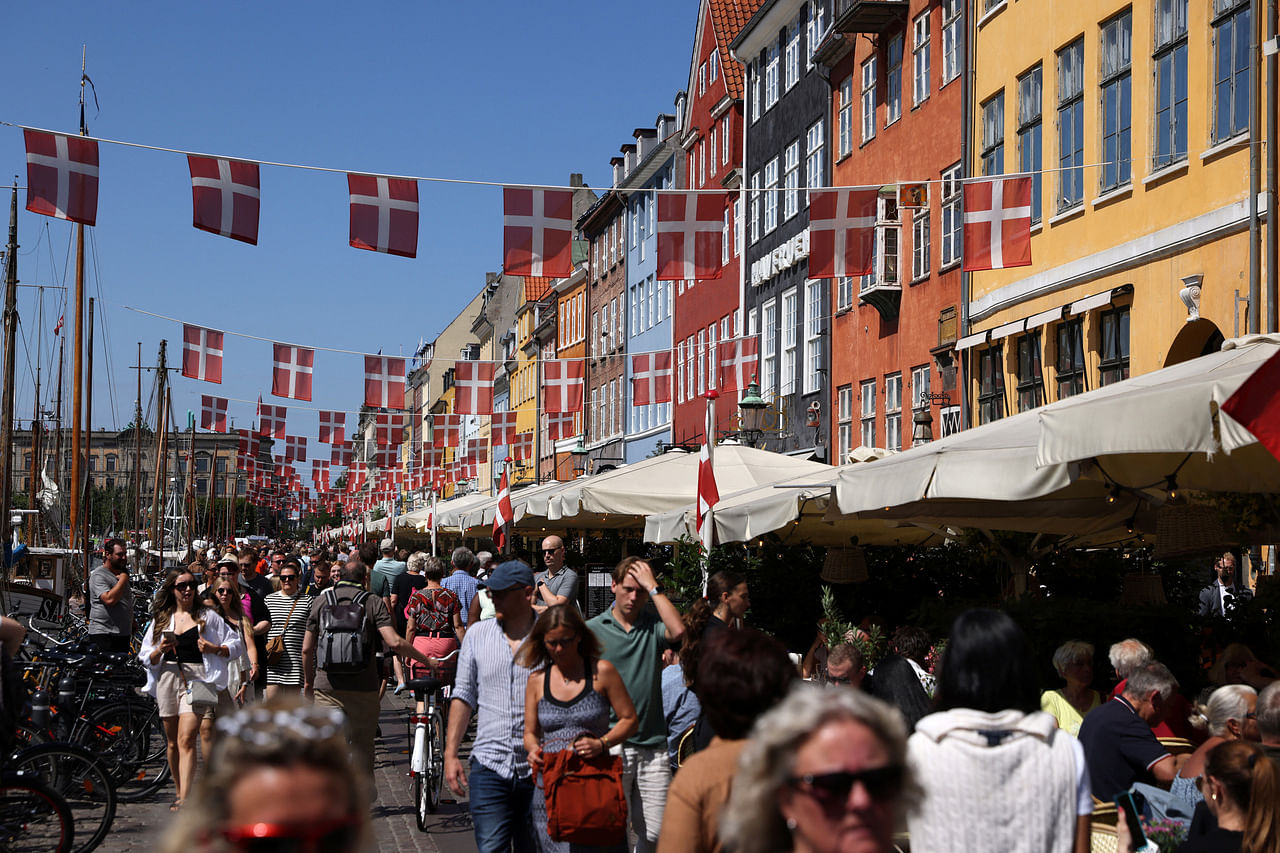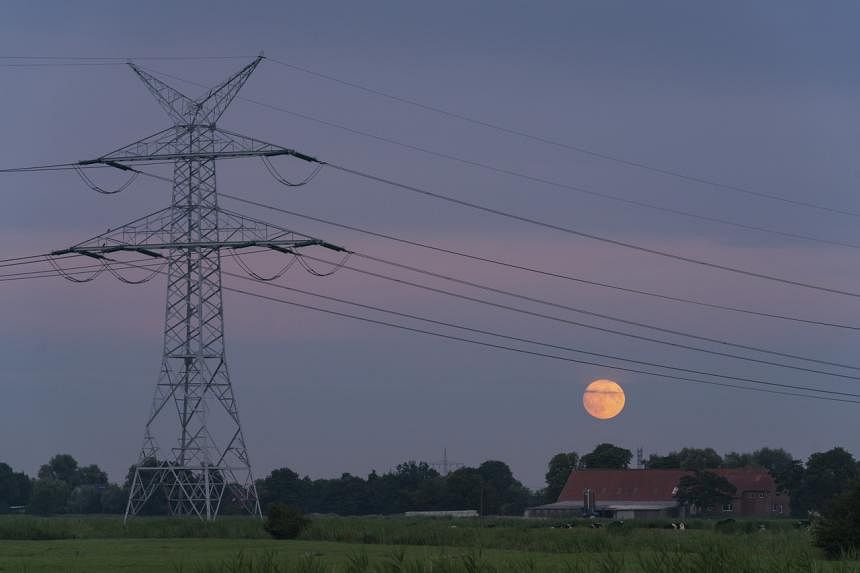BERLIN (BLOOMBERG) - Europeans are taking colder showers, offices are turning down thermostats, and stores are dimming lights to avoid blackouts and freezing homes this winter in the fallout from Russia's war in Ukraine.
As the Kremlin slashes gas deliveries and power-plant outages intensify a supply squeeze, Europe has little alternative but to curtail demand.
Measures so far have been uneven, but the urgency is growing as wholesale prices continue to surge.
While some countries such as Germany, where nearly half the homes rely on gas for heating, are more exposed than others, the European Union is seeking to band together. The bloc's member states aim to cut gas use by 15 per cent through this winter if Russia - which historically covered about 40 per cent of EU demand for the fuel - turns off the tap.
Here's an overview of some of the key initiatives to curb energy usage.
Goodbye, warm pools
German Chancellor Olaf Scholz's Cabinet approved a raft of measures this week to help cut gas consumption by a fifth this fall and winter.
The national measures, which add to steps taken by towns across Germany such as cutting off warm water in public pools, are aimed at reducing gas use by about 2 per cent and include: a ban on heating private swimming pools; no longer heating some areas in public buildings; lowering the minimum office temperature to 19 deg C; banning most outside lighting for buildings and monuments; boosting energy efficiency in public and private buildings.
French President Emmanuel Macron has set a target to reduce energy consumption in 2024 by 10 per cent compared with 2019's level.
His administration last month set up a series of working groups focused on government operations, real estate, tech and telecoms, and shopping centres and other public sites. The goal is to have specific proposals by the end of September.
While there has been few concrete steps so far, there have been a smattering of initiatives.
By October, French supermarket chains will turn off illuminated store signs after closing, and retail spaces will reduce lighting by 30 per cent and lower temperatures to 17 deg C during peak shopping hours, if there is government guidance to do so.
To set an example, the country's Finance Ministry said it would only turn on the heat when office temperatures fall below 19 deg C and would not cool it unless the mercury goes higher than 26 deg C.
In Italy and Spain
A fresh plan to reduce Italy's consumption could be approved at a Cabinet meeting as early as next week.
Energy prices have become a key issue of the campaign ahead of the snap Sept 25 election to replace Prime Minister Mario Draghi.
The centre-left is proposing price controls for electricity, a move criticised by right-wing frontrunner Giorgia Meloni, who instead wants an EU-wide initiative.
According to Italian media, the country's savings plan could include: lowering temperatures and shortening heating hours in homes and offices during winter to cut gas used for heating by more than 10 per cent; reducing public and shop lighting at night; and, extending the life of coal plants to reduce gas used for power generation.
Factories halts may be part of the plan, but several energy-intensive industries are already curtailing operations because of spiralling costs
In a rare step to legally mandate lower consumption, Spanish lawmakers on Thursday passed rules put in place by decree in early August.
The steps include: limiting air-conditioning to 27 deg C in public buildings and most businesses, as well as in airports and train stations; setting heating at no more than 19 deg C in winter, except for hotel rooms, restaurant kitchens, hair salons, gyms, schools and hospitals; banning lighting of monuments and shop windows at night; requiring shop doors to be closed whenever heating or cooling systems are on.
'Good example'
In line with the EU target, Switzerland will ask, but not compel, households and businesses to cut gas use by 15 per cent from October to March by taking steps like lowering indoor heating temperatures.
The government is setting the same target for its own administration to set a "good example".

If the voluntary approach does not work, the government is consulting on compulsory measures that include forcing gas-burning industrial plants to switch to oil and supply reductions for the public sector.
For now, Switzerland is saying private households will be exempt from any compulsory rationing.
Finland's Prime Minister Sanna Marin's government announced a campaign challenging consumers and households, as well as companies and organisations to reduce consumption, targeting 75 per cent of its citizens to take part.
The joint campaign by the Economy Ministry and other organisations was announced Thursday and has a long-term goal to permanently lower energy use.
The campaign will formally kick off in October and proposes: lowering indoor temperatures; increasing the use of public transport, and for motorists driving at slower speeds; taking shorter showers; and reducing time spent on digital devices.
Tips and recommendations
Swedish Prime Minister Magdalena Andersson's government hopes to use about US$5.8 billion (S$8.1 billion) in so-called bottleneck revenue to compensate households and companies, and the Swedish Energy Agency has presented various tips to help cut energy use in domestic homes.
These include: insulating attics and facades, with the government offering a tax rebate for associated labour costs; switching to more efficient water taps; sealing, renovating or replacing windows and exterior doors; supplementing heating systems with a heat pump.
Denmark Prime Minister Mette Frederiksen's administration has not set concrete reduction targets beyond the EU goal of 15 per cent cut in gas use, which it has already reached.

The authorities have given a number of recommendations for Danes to follow including: shutting down heating systems over the summer; cutting daily hot showers to five minutes from 15 minutes, saving an average household about US$700 a year; using a clothesline instead of a tumble dryer to save households about US$350 annually; running household appliances, like dishwashers, at night to take advantage of cheaper, off-peak power prices.
Less bright Christmas
The Dutch government is not implementing measures specifically for this winter, and the state-owned gas company has said the country will have enough supplies for this winter.
But the "Save Energy Now!" campaign encourages people to make their homes more efficient by using heat pumps, ventilation with a heat-recovery function, solar water heating and better insulation for roofs, floors and windows.
Vienna has pledged to save some costs by delaying the start of winter lighting for Christmas markets, while ski centres may also reduce offerings by blasting less artificial snow and limiting night-time operations.
The national government has yet to impose mandatory measures with the country on track to fill one of the continent's largest gas storage networks to 80 per cent of capacity.
Greek Prime Minister Kyriakos Mitsotakis's government announced measures in June to curb public-sector energy use by 10 per cent in the near future and by 30 per cent by the end of the decade.
The authorities will offer financial incentives to organisations that save energy and will also create a digital system for monitoring consumption.
Measures include: temperature controls in buildings; turning off lights and computers; and changes to street lighting.

